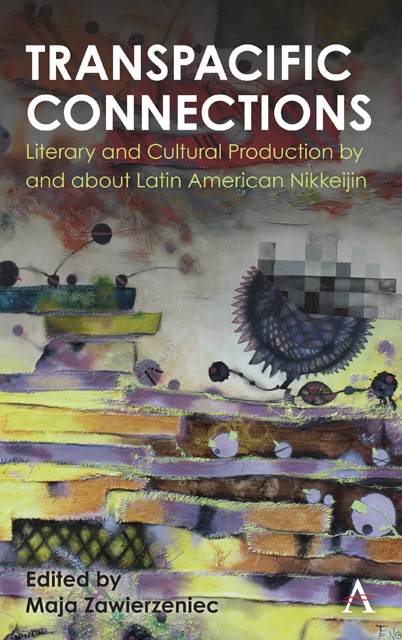Book contents
- Frontmatter
- Contents
- Notes on Contributors
- Introduction
- Chapter 1 The “Japanese Community” in Brazil and its Literary Production: The Functioning of “Death” in Matsui Tarô’s Literary Fiction
- Chapter 2 Contested Modernities: Representations of the Brazilian Dekasegi and the Nipponization of Brazil in Nikkei Cultural Production
- Chapter 3 When Gustave Flaubert Meets Ryūnosuke Akutagawa: “Corazón Sencillo” by Augusto Higa Oshiro. The Short Story of a Peruvian Nikkei Writer
- Chapter 4 Japanese Prints in Tablada’s Writings: Cultural and Media Transposition in ‘El poema de Okusai’
- Chapter 5 The Telenovela Oyuki’s Sin (El Pecado De Oyuki): Las Realidades Del Otro or Mexico through A Japanized Lens
- Index
Chapter 3 - When Gustave Flaubert Meets Ryūnosuke Akutagawa: “Corazón Sencillo” by Augusto Higa Oshiro. The Short Story of a Peruvian Nikkei Writer
Published online by Cambridge University Press: 09 December 2022
- Frontmatter
- Contents
- Notes on Contributors
- Introduction
- Chapter 1 The “Japanese Community” in Brazil and its Literary Production: The Functioning of “Death” in Matsui Tarô’s Literary Fiction
- Chapter 2 Contested Modernities: Representations of the Brazilian Dekasegi and the Nipponization of Brazil in Nikkei Cultural Production
- Chapter 3 When Gustave Flaubert Meets Ryūnosuke Akutagawa: “Corazón Sencillo” by Augusto Higa Oshiro. The Short Story of a Peruvian Nikkei Writer
- Chapter 4 Japanese Prints in Tablada’s Writings: Cultural and Media Transposition in ‘El poema de Okusai’
- Chapter 5 The Telenovela Oyuki’s Sin (El Pecado De Oyuki): Las Realidades Del Otro or Mexico through A Japanized Lens
- Index
Summary
Introduction
Augusto Higa Oshiro is a Peruvian Nikkei writer, born in 1946 to Japanese migrants. He has published short stories about life in popular areas of Lima, collected in his Que te coma el tigre (1978) and La casa de Albaceleste (1987). In an attempt to rediscover his heritage, Higa spent several months in Japan between 1990 and 1992 as a dekasegi. This experience disappointed him and led him to write Japón no da dos oportunidades, published in 1994. After 14 years of silence, he published La iluminación de Kazuo Nakamatsu (2008), and then Gaijin (2014). Between those publications, he released Okinawa existe (2013). Among other stories, this collection contains three texts dealing with the difficult problem of Nikkei identity: “Okinawa existe,” “Extranjero,” and “Polvo enamorado.” With these texts Higa enters in his Nikkei period as a writer. He himself calls his productions “nisei literature,” since he is nisei (Soto-Mejía, 2017 ). “Nisei” means “second generation” and applies to people of Japanese ascendance born out of Japan from a first generation who came directly from Japan. I also use the term nisei when I make references to the texts of this period as a whole in this work.
I will offer here an analysis of some aspects of the story “Corazón sencillo” from La casa de Albaceste. More than a sociological study, the reader will find below a literary analysis of an unstudied text in the academic world. Reference material being almost inexistent. I propose my own analysis, heavily based on the artistic material. While this is not a nisei story, Ricardo González Vigil, in the prolog of Todos los cuentos (2014), points out two sources of inspiration for this story (of course, among others he mentions or not). The first is “Un Coeur simple,” by the French writer Gustave Flaubert (1821–1880). The second is the short story “Sennin” by the Japanese writer Ryūnosuke Akutagawa (1892–1927). He writes, more precisely:
En cuento al estilo fatalista que Higa conecta con el andino, aludiendo a los protagonistas de “Corazón sencillo” […] nos parece que se alimenta del componente fatalista de su herencia cultural japonesa. Resulta sintomático que el magistral cuento “Corazón sencillo” […] reelabora el cuento “Sennin” de un clásico japones contemporáneo, Ryūnosuke Akutagawa. (González Vigil, 2014 : 14)
The statement is interesting because there is no proof that Higa intentionally or unintentionally rewrote Akutagawa's story.
- Type
- Chapter
- Information
- Transpacific ConnectionsLiterary and Cultural Production by and about Latin American Nikkeijin, pp. 51 - 64Publisher: Anthem PressPrint publication year: 2022



